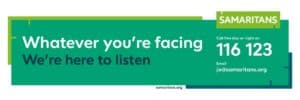Samaritans Encourage Us To Become Better Listeners
July 21, 2021
Samaritans’ vision is that fewer people die by suicide. They work across the UK and Ireland to reduce the number of people who take their own life and help those struggling to cope. Every day, Samaritans volunteers respond to around 10,000 calls for help. Day or night, Samaritans are there to listen without judgement or pressure.
Their annual awareness campaign Talk to Us #We Listen is back this July and will culminate this Saturday 24 July on Samaritans Awareness Day. The focus will be on encouraging everyone to be a better listener by making a few changes to the way we listen. Tips on how to do this can be found here.
Improving listening skills was a key element of the training delivered earlier this month when Cheshire East Social Action Partnership (CESAP), Cheshire East Council and Samaritans offered a one-day course in Managing Suicidal Conversations to the Voluntary, Community, Faith and Social Enterprise (VCFSE) sector across Cheshire East.
Topics covered included: recognising the factors that lead to suicide; recognising signs of distress and suicidal thoughts; showing that you have listened, heard and understood; and feeling confident to converse with someone who is feeling suicidal.
Emma McKenzie from Healthwatch Cheshire who attended the course said “I’ve attended Samaritans’ training courses before and have found them to be well-organised and useful. When I saw this course advertised I thought it would be beneficial to my signposting role at Healthwatch Cheshire as I sometimes speak to people who feel at the end of the line.
I found the training supportive, interactive and thought-provoking. I came away with a better understanding of what might make someone feel suicidal, the knowledge to be able to spot these thoughts and behaviours and the confidence to talk directly to someone about it, knowing that listening can save lives”.
When life is difficult, Samaritans are here – day or night, 365 days a year.
You can call them free on 116 123 (within the UK or Ireland) or email them at jo@samaritans.org
Please scroll through this 4-page document from the NHS :
Posted:

